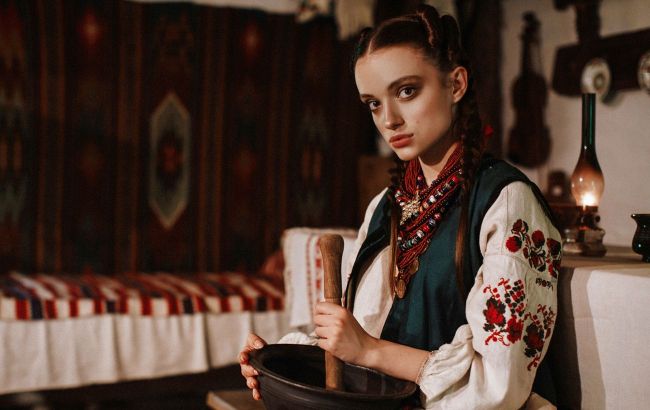9 common names you thought were Ukrainian — but history says otherwise
 Which names are often mistaken as Ukrainian but are not (photo: Freepik)
Which names are often mistaken as Ukrainian but are not (photo: Freepik)
Many names now considered purely Ukrainian and ancient actually have foreign origins. They entered Ukrainian usage during different historical periods. RBC-Ukraine provides several examples that may surprise you.
Nataliia (Natalia)
The name Nataliia has ancient Latin roots. It comes from the word Natalis, meaning "native" or "related to birth."
There is also a popular version linking Nataliia to the Latin phrase Dies Natalis Domini, which translates as "the Lord's birthday," or Christmas. Because of this, the name is often interpreted as "Christmas-born," "born at Christmas," or "blessed."
The name Nataliia originated in Ukraine, following the adoption of Christianity, and was influenced by Church Slavonic and Greek traditions. Although foreign in origin, it became very popular in Ukrainian culture and was long ago regarded as native. Its wide popularity owes much to Ivan Kotliarevskyi's famous play Natalka Poltavka.
Tatiana
This name is not originally Slavic, though it is extremely popular in Ukraine. Tatiana has Latin roots.
It derives from the ancient Roman family name Tatianus, meaning "belonging to the Tatius family" or "descendant of Tatius." Tatius was the name of a legendary king of the Sabines, an ancient Italian tribe. According to tradition, he ruled jointly with Romulus, the founder of Rome.
The name Tatiana gained widespread recognition thanks to Saint Tatiana of Rome, a 3rd-century martyr who died for her faith. With Christianity's spread in Rus', many Latin and Greek names, including Tatiana, entered Ukrainian culture via the church calendar.
Marina
The name Marina has Latin origins. It comes from marinus, meaning "of the sea" or "marine."
This name is associated with the ancient Roman goddess Venus, sometimes referred to as Venus Marina ("Sea Venus"), as myths claim she was born from sea foam.
In Ukraine, Marina came with Christianity, as Saint Marina (Margaret) of Antioch is honored in the church calendar.
Hanna (Anna)
Hanna (or Anna) is one of the most common names worldwide, as well as in Ukraine. It has ancient Hebrew roots, coming from Hannah, which means "grace," "favor," or "beloved."
In the Bible, this was the name of the prophet Samuel’s mother and also of Saint Anne, the mother of the Virgin Mary.
In Ukraine, the name gained popularity early on with the spread of Christianity. Over time, it took the form "Hanna," which is more characteristic of the Ukrainian language.
Olena
Olena comes from ancient Greek. It derives from Helene, meaning "light," "bright," "shining," or "torch." In Greek mythology, Helen of Troy symbolized unmatched beauty.
The name spread throughout the Christian world due to Saint Equal-to-the-Apostles Helena, mother of Emperor Constantine the Great. She found the Life-giving Cross of the Lord.
Ivan
Though Ivan is considered one of the most Ukrainian and common names, it also has ancient Hebrew origins. It derives from Yochanan, meaning "Yahweh (God) is gracious" or "God is merciful."
The name came to Rus' (and later Ukraine) with Christianity in the 10th century. It quickly became one of the most popular male names, replacing many old Slavic names.
At one point, Ivan became so widespread that it was seen as a typical Ukrainian and often Slavic name in general. It is strongly associated with the image of a simple, hardworking, often wise Ukrainian, a hero of folk tales ("Ivan Tsarevich," "Ivan Pobivan"), and a Cossack.
Mariia
Maria is another name of ancient Hebrew origin. The original name Miryam has several possible meanings: "bitter" (linked to the bitterness of slavery in Egypt), "desired child," "lady," or "one who loves God."
Its greatest popularity came from the Virgin Mary, mother of Jesus Christ. In Christianity, she symbolizes purity, motherhood, humility, and mercy.
This association gave the name extraordinary holiness and respect.
Maria came to Ukraine with Christianity. Due to the veneration of the Mother of God, it quickly became one of the most popular female names and is deeply rooted in Ukrainian tradition. The name appears in church records, folk songs, literature, and everyday life for centuries.
It is also widely present in world literature, painting, music, and folklore. In Ukraine, it frequently appears in artistic works, emphasizing its cultural significance.
Mykhailo
Mykhailo also originates from ancient Hebrew. It comes from the phrase Mikha'el, meaning "Who is like God?" or "Equal to God?" (implying "no one is like God").
The name is associated with Archangel Michael, one of the most revered archangels in Christian, Islamic, and Jewish traditions. He is the protector of warriors and defender against evil.
Kateryna
Kateryna has ancient Greek origins. It comes from the name Aikaterine, whose exact meaning is debated. Most often, it is interpreted as "pure," "immaculate," or "virgin."
The name became famous thanks to Saint Catherine of Alexandria, a great martyr and patroness of students, philosophers, and others.
Kateryna came to Ukraine with Christianity and church tradition. It quickly became popular among girls, symbolizing beauty, purity, and resilience.
Sources: Dictionary of Ukrainian Names, Wikipedia.

